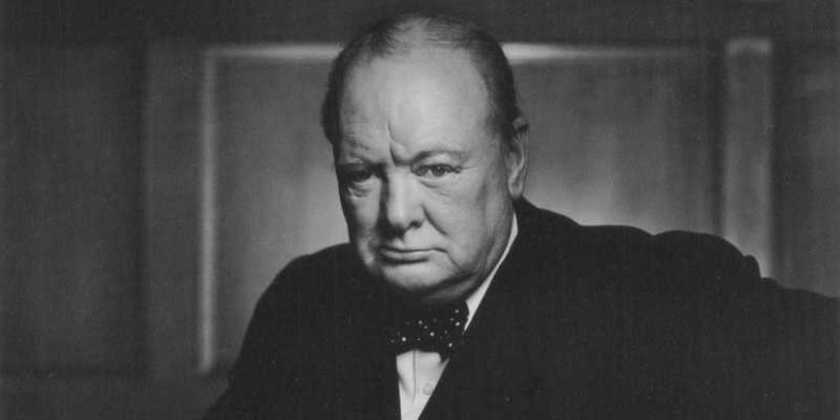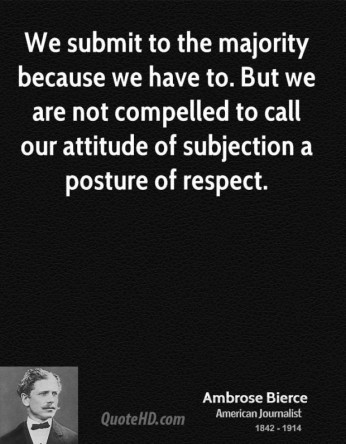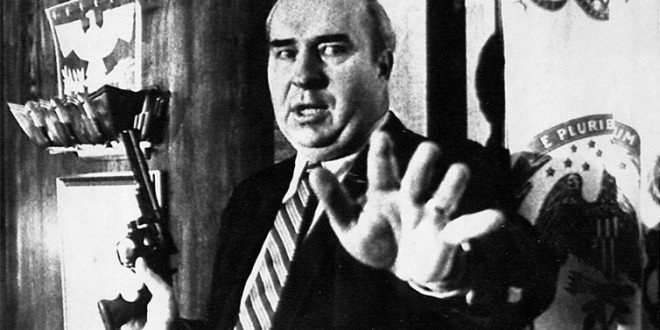Two hundred and forty-two years ago, our founding fathers bequeathed to us a nation unique in all history. A nation founded on an idea, that all men are created equal, and government derives its powers from the just consent of the governed. A Federal, Constitutional Republic in which our politicians are not our ‘leaders’ but rather our Representatives, operating within a system of diffuse powers with checks and balances, periodically accountable through democratic processes to their bosses – the people who put them there.
In modern times, it has become fashionable to point to the flaws in such a system. Howard Zinn and others present a victim’s-eye narrative of American history. Smug, faculty iconoclasts and a pop culture Commentariat, decrying the ‘sugar coated fairy tales’, of our past. Yet, the Great Winston Churchill may have had the final word, describing ‘Democracy” as the worst form of government there is…except for all the others.

For many among us, most I should think, some form of that Constitutional, self-governing Republic envisioned by our founders, remains preferable to all other forms of government. Warts and all.
History is replete with examples of what power concentrated in the hands of a few, leads to.
 Indeed, such a system has imperfections, not least among them those who would ascend to political office.
Indeed, such a system has imperfections, not least among them those who would ascend to political office.
Hearst columnist Ambrose Bierce, a social satirist of his day and my favorite curmudgeon, once defined politics as ‘A strife of interests, masquerading as a contest of principles. The conduct of public affairs for private advantage.
In the late 19th century, Democrat William “Boss” Tweed owned New York politics, fleecing city taxpayers at the head of the Tammany Hall political machine. New York debt levels soared by over $100 million between 1868 and 1870 alone, a figure equivalent to over a Billion dollars, today.
As Governor of Tennessee, Democrat Ray Blanton ran a ‘pay for play’ operation selling pardons, paroles and commutations, until drawing the attention of the eye of Sauron, at the FBI. Blanton’s corruption was extensive enough to spawn a book and a later movie, and launched the political career of prosecutor and sometime actor, Fred Thompson.
And, lest I be accused of picking on Democrats, Pennsylvania Republican and Representative in Congress R. Budd Dwyer faced up to 55 years in prison and a $300,000 fine for racketeering and mail fraud, when he took a .357 Magnum revolver out of a manila envelope and blew his brains out. On live television, no less.

There are so many more and we all have our ‘favorites’, in this parade of horribles. Yet, for insensate cupidity and pure boneheadedness, it would be hard to outdo the attorney, circuit court judge and member of the United States House of Representatives, Andrew Jackson May.
The Kentucky Democrat was a staunch supporter of the ‘New Deal’ policies of President Franklin Delano Roosevelt, serving in seven succeeding Congresses between 1931 and 1947. As Chairman of the powerful Committee on Military Affairs, May became involved with New York businessmen Murray and Henry Garsson, a relationship which would lead to war profiteering allegations.

After the war, a Senate investigating committee discovered evidence of substantial kickbacks from the Garsson brothers. Making matters worse, their munition business took excessive profits, while producing shoddy product. May’s bribery scandal revealed evidence that the Garsson factory produced defective fuses for their 4.2-inch mortar shells, detonating prematurely and leading to the death of no fewer than 38 American soldiers.
Andrew May would serve nine months in Federal prison for accepting bribes in exchange for securing munitions contracts during WW2.
Yet, even that pales in comparison with the ‘May incident’, for which the man has earned eternal infamy. As an influential member of an important committee, Andrew May was necessarily entrusted with highly confidential information, among them deficiencies in Imperial Japanese Navy anti-submarine depth-charge tactics.

For some time, the American submarine service had enjoyed considerable success in its war on Japanese shipping. Imperial Japanese naval planners held some bad assumptions about American submarine specifications, among them maximum depth capabilities.
Japanese depth charges were set to detonate at too shallow a depth, leading to a high survival rate for American subs. Congressman May took care of that problem, in 1943.
Returning home from a junket, the Congressman revealed this highly sensitive information, before a press conference. Various press associations ran with the story and some were bright enough to ‘sit on it’, but not all. Several newspapers published the information, including one in Hololulu.

Japanese naval ASW (Antisubmarine Warfare) forces were quick to adjust depth charge settings. Vice Admiral Charles A. Lockwood, commander of the U.S. submarine fleet in the Pacific, estimated that May’s indiscretion killed as many as 800 American crewman, with the loss of ten submarines. “I hear Congressman May said the Jap depth charges are not set deep enough”, he said. “He would be pleased to know that the Japs set them deeper now.”
Andrew Jackson May was convicted by a federal jury on this day in 1947, for accepting cash bribes from Murray and Henry Garsson, to use his position as Chairman of the Military Affairs Committee to secure munitions contracts for the Garsson firm. The Garsson brothers also received prison terms.
President Harry Truman granted May a full pardon in 1952, though his political career was finished. Andrew May returned home to Kentucky to resume the practice of law, until his death in 1959. We are left only to contemplate, what the man or the press could be thinking, to divulge information more safely left in the hands of a stupid child. That, and the horrifying realization that the democratic process might actually work, and the government we elect is just…like…Us.



I remember Ray Blanton oh so well and Lamar Alexander walking across the state and succeeding him.
LikeLiked by 1 person
I try to stick to straight history in this blog, without the taint of politics. It’s not that I’m not a political animal, I am, but I get sick of it and it’s everywhere these days. That said, I can’t stand these guys who get into government to line their pockets.
LikeLiked by 1 person
Oh, I stay out of politics. I feel sometimes we are just pawns in their game…and that is both sides at times… I live near Nashville and I remember the song “Pardon Me Ray” and the news every night as an 11 year old. It really sticks out in my mind.
LikeLiked by 1 person
I’ve only been to Nashville once but it’s a great town. I thought it was a country music town which suits me fine, but I discovered it’s a music town. You could step into a random dive bar and find any style you like being performed at a far higher level than what you’d expect in such a small venue.
LikeLiked by 1 person
It’s turned into a real music city now. Personally, I like old country the best. Merle Haggard, Hank Williams SR etc… back in the 50s-80s it was mostly only country music there….now you can get anything. The best way to describe Nashville is a big small town…to me anyway
LikeLiked by 1 person
I live up in Cape Cod, about an hour and a half south of Boston. We don’t have much of a music scene here, but plenty to interest the Rev. War and maritime history geek. That stuff always turned my crank.
LikeLiked by 1 person
Well you do have the Red Sox close by anyway also. I am a huge baseball fan and I will admit…I would trade the Titans for any mlb team to come to Nashville…I’m not a typical southerner… I can only imagine all the revolutionary war places you have…That would be very interesting.
LikeLiked by 1 person
I love me some Red Sox baseball. That drought ending victory over the Evil Empire leading to the 2004 World Series victory, was one of the great moments in sports. They do a re-enactment of the dawn battles at Lexington and Concord every April. I have to get up at two and get there while it’s pitch dark, but it’s worth it.
LikeLiked by 1 person
I’m a Dodger fan… I got it honestly. My dad’s brothers loved the Yankees in the 50s and he liked the underdog Dodgers. Since I was 10 in 77 I’ve been following them. I was happy also in 2004…what a comeback. I hate the Yankees and Giants… In the 78 the Red Sox had a better team I still say.
I’ve never been to a re-enactment… That would be very interesting.
LikeLiked by 1 person
Politics is war by other means
LikeLiked by 1 person